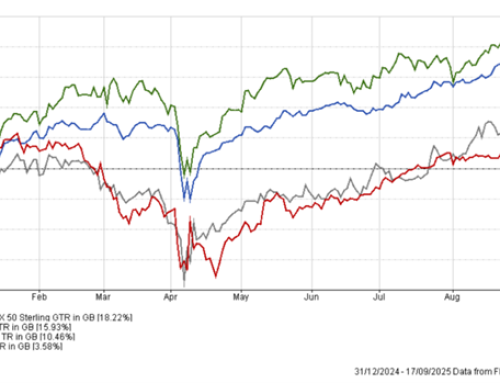Andrew’s Views
‘But’
Economies throughout the world are doing well at the moment. News last week regarding US jobs data was significantly better than expected meaning that the chance of a recession is becoming less and less likely. China’s fiscal stimulus is having the desired effect with Chinese equities rising 20% at one point. Economists broadly agree that Labour will be successful in stimulating the UK economy without having to spend too much money, and they have confidence that the 30th October looming budget will not have too much effect on people’s monthly take home pay.
So, things are good right now. But… The Middle East, once again, could be a huge problem. Neither Lebanon nor Isreal contributes much to the world economy, but Isreal reacting to Iran’s involvement could make things tricky for everyone. If Isreal starts to target Iran’s oil producing facilities or ports it could cause a spike in oil prices, which affects everyone in the world. One of the largest recessions in living memory, the oil crisis of 1974, was caused by a jump in oil prices. The recent cost of living crises was in part caused by the spike in oil and energy prices, so we know the negative effect that oil price rises can cause. How likely this scenario is remains to be seen. Isreal is well aware that it owes its continued existence to the good will of many western nations, mainly the US but also the UK. If its actions caused direct economic harm to either of those nations, how long would that good will last?
We are also hearing from most economists that a win for Trump in the US election will trigger major uncertainty in the markets. While Trump is very business friendly, if he cuts taxes without them being funded again so the US has to borrow significantly more, like he did last time, this could upset the dollar’s value and the credit rating of the world’s largest economy, neither of which would be a good thing. It also seems he may once again go on a tariff rampage. He doesn’t quite understand that putting tariffs on Chinese goods doesn’t cost China anything, it costs the US importers money, effectively crippling his own economy. If there are retaliation tariffs put in place, then the US could see their exports drop sharply which would again have an effect on the US economy rather than on the target of the tariffs. So most sensible economists are hoping for a Harris win in November.
At moment the answer on which outcome is more likely in both of the above scenario is unknown, so watch this space.
Markets
As mentioned above the data coming out of the US is very positive and we expect this sector to continue to outperform other markets. The tech sector in particular, while currently priced very high both in current and historic terms, still has a bright outlook with AI barely scratching the surface of its potential presently. Even outside of the tech sector, the US is still in the recovery phase of its cycle, and we see significant upside before this turns.
Worldwide we may see interest rates cut more aggressively than we previously thought as world banks move to stave off slowing growth. While the evidence of a slow down is not yet apparent, models have shown that the risk of a slowing world economy is quite high. Cuts in interest rates are good for equity markets and property markets, so if, as we expect, interest rates are cut continuously for the next 2 years we should see some excellent returns in most global share markets.
While UK shares are not expected to have the same growth potential as other markets, the UK has excellent ‘Value’ shares to benefit from. Value shares are generally companies that pay high dividends that are currently trading below their expected value. The UK growth sector has struggled the last couple of years, but the UK Equity Income sector has outpaced even the US over the last 12 months, and we can expect to see that continue in the near future.
Europe is expected to struggle going forward. It has very few technology-based stocks and many of the larger economies are struggling to grow in line with their expectations. There are some good shares to hold over the long term as there seems to be room for appreciation, but in the short term we do not expect Europe to be much of a driver in World growth.
Japan is still struggling (as I feel it always does) and I don’t see much happening there, the same in Emerging Markets as they are so heavily weighted towards commodity prices. With the entire world struggling to meet growth targets there is little expectation of strong growth in the commodities market. China has grown significantly since their government announced new fiscal stimulus, but we still think there is room to grow here. This may have a knock-on effect from countries around China and boost their growth as well.
Finally, fixed interests. Historically a cautious part of a portfolio, these have been very volatile over the last few years, falling up to 40% in 2022 which, up until then, had been unheard of. As interest rates fall, we see government bonds making up some of that huge drop as they get back to their previous value, but we don’t think the holding of corporate bonds makes as much sense. Corporate bonds are significantly higher risk than government bonds, but due to the expected rise in equities, we feel that we can get a better return with shares than we can with corporate bonds for a similar risk profile.


